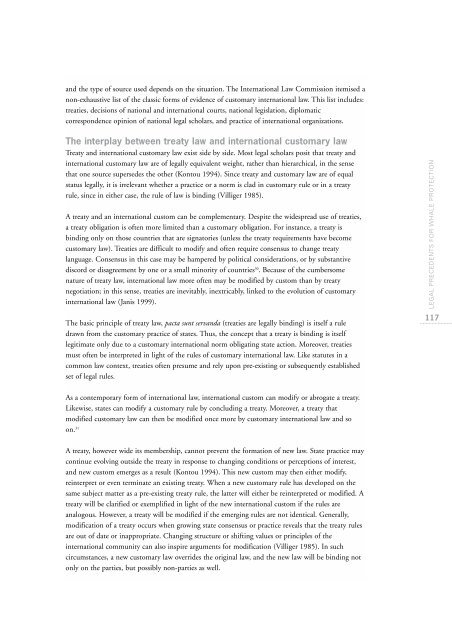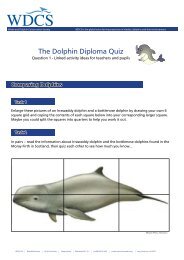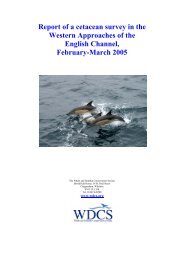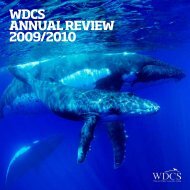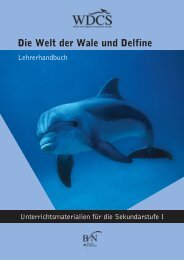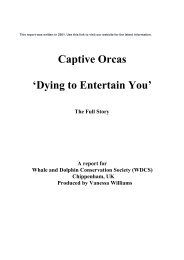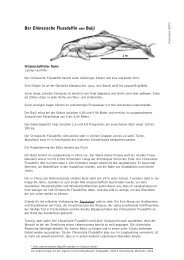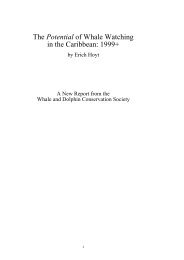TROUBLED WATERS - Whale and Dolphin Conservation Society
TROUBLED WATERS - Whale and Dolphin Conservation Society
TROUBLED WATERS - Whale and Dolphin Conservation Society
You also want an ePaper? Increase the reach of your titles
YUMPU automatically turns print PDFs into web optimized ePapers that Google loves.
<strong>and</strong> the type of source used depends on the situation. The International Law Commission itemised a<br />
non-exhaustive list of the classic forms of evidence of customary international law. This list includes:<br />
treaties, decisions of national <strong>and</strong> international courts, national legislation, diplomatic<br />
correspondence opinion of national legal scholars, <strong>and</strong> practice of international organizations.<br />
The interplay between treaty law <strong>and</strong> international customary law<br />
Treaty <strong>and</strong> international customary law exist side by side. Most legal scholars posit that treaty <strong>and</strong><br />
international customary law are of legally equivalent weight, rather than hierarchical, in the sense<br />
that one source supersedes the other (Kontou 1994). Since treaty <strong>and</strong> customary law are of equal<br />
status legally, it is irrelevant whether a practice or a norm is clad in customary rule or in a treaty<br />
rule, since in either case, the rule of law is binding (Villiger 1985).<br />
A treaty <strong>and</strong> an international custom can be complementary. Despite the widespread use of treaties,<br />
a treaty obligation is often more limited than a customary obligation. For instance, a treaty is<br />
binding only on those countries that are signatories (unless the treaty requirements have become<br />
customary law). Treaties are difficult to modify <strong>and</strong> often require consensus to change treaty<br />
language. Consensus in this case may be hampered by political considerations, or by substantive<br />
discord or disagreement by one or a small minority of countries 30 . Because of the cumbersome<br />
nature of treaty law, international law more often may be modified by custom than by treaty<br />
negotiation; in this sense, treaties are inevitably, inextricably, linked to the evolution of customary<br />
international law (Janis 1999).<br />
The basic principle of treaty law, pacta sunt serv<strong>and</strong>a (treaties are legally binding) is itself a rule<br />
drawn from the customary practice of states. Thus, the concept that a treaty is binding is itself<br />
legitimate only due to a customary international norm obligating state action. Moreover, treaties<br />
must often be interpreted in light of the rules of customary international law. Like statutes in a<br />
common law context, treaties often presume <strong>and</strong> rely upon pre-existing or subsequently established<br />
set of legal rules.<br />
As a contemporary form of international law, international custom can modify or abrogate a treaty.<br />
Likewise, states can modify a customary rule by concluding a treaty. Moreover, a treaty that<br />
modified customary law can then be modified once more by customary international law <strong>and</strong> so<br />
on. 31<br />
A treaty, however wide its membership, cannot prevent the formation of new law. State practice may<br />
continue evolving outside the treaty in response to changing conditions or perceptions of interest,<br />
<strong>and</strong> new custom emerges as a result (Kontou 1994). This new custom may then either modify,<br />
reinterpret or even terminate an existing treaty. When a new customary rule has developed on the<br />
same subject matter as a pre-existing treaty rule, the latter will either be reinterpreted or modified. A<br />
treaty will be clarified or exemplified in light of the new international custom if the rules are<br />
analogous. However, a treaty will be modified if the emerging rules are not identical. Generally,<br />
modification of a treaty occurs when growing state consensus or practice reveals that the treaty rules<br />
are out of date or inappropriate. Changing structure or shifting values or principles of the<br />
international community can also inspire arguments for modification (Villiger 1985). In such<br />
circumstances, a new customary law overrides the original law, <strong>and</strong> the new law will be binding not<br />
only on the parties, but possibly non-parties as well.<br />
LEGAL PRECEDENTS FOR WHALE PROTECTION<br />
117


